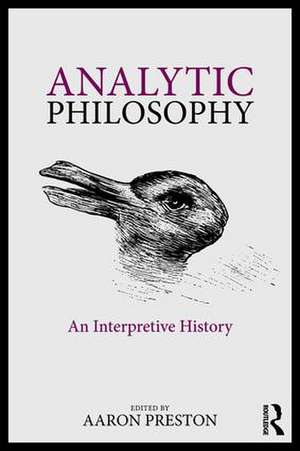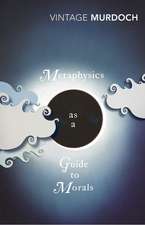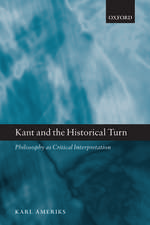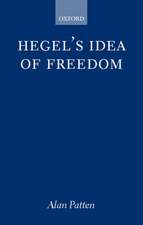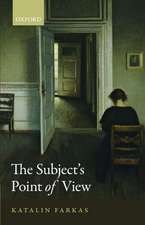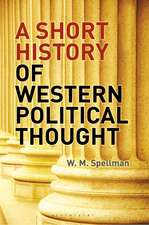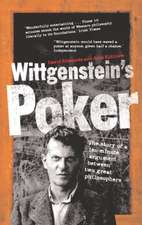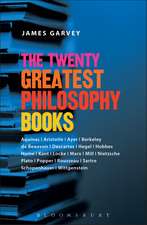Analytic Philosophy: An Interpretive History
Editat de Aaron Prestonen Limba Engleză Paperback – 22 feb 2017
| Toate formatele și edițiile | Preț | Express |
|---|---|---|
| Paperback (1) | 448.86 lei 6-8 săpt. | |
| Taylor & Francis – 22 feb 2017 | 448.86 lei 6-8 săpt. | |
| Hardback (1) | 1113.16 lei 6-8 săpt. | |
| Taylor & Francis – 20 feb 2017 | 1113.16 lei 6-8 săpt. |
Preț: 448.86 lei
Nou
Puncte Express: 673
Preț estimativ în valută:
85.89€ • 91.85$ • 71.61£
85.89€ • 91.85$ • 71.61£
Carte tipărită la comandă
Livrare economică 17 aprilie-01 mai
Preluare comenzi: 021 569.72.76
Specificații
ISBN-13: 9781138800793
ISBN-10: 1138800791
Pagini: 298
Dimensiuni: 152 x 229 x 23 mm
Greutate: 0.44 kg
Ediția:1
Editura: Taylor & Francis
Colecția Routledge
Locul publicării:Oxford, United Kingdom
ISBN-10: 1138800791
Pagini: 298
Dimensiuni: 152 x 229 x 23 mm
Greutate: 0.44 kg
Ediția:1
Editura: Taylor & Francis
Colecția Routledge
Locul publicării:Oxford, United Kingdom
Recenzii
"The idea of shedding light on a philosophical tradition by looking at interpretations of philosophical texts that shaped it is intriguing and original. Analytic Philosophy: An Interpretative History shows that this approach can yield important insights into analytic philosophy as well as the texts that shaped it."
--Mark Textor, King's College London
"This book offers a bold and invigorating new set of perspectives on the history of analytic philosophy, centring on the idea of a tradition-shaping interpretation. This is an interpretation of anything, from an individual text to a whole tradition, that transforms our understanding of the relevant tradition. That such interpretations have indeed played a major role in the construction of analytic philosophy is brought out, convincingly and insightfully, through an excellent choice of case studies by many of the leading scholars in the field. This book is to be recommended not only to all those concerned with analytic philosophy and its history but also to anyone interested in philosophical historiography."
--Michael Beaney, Humboldt-Universität zu Berlin and King’s College London
"This is a provocative collection of essays which provide new ways of thinking about the origins, identity, and significance of analytic philosophy. The essays combine substantive scholarship with critical insights to challenge traditional narratives about the rise of analytic philosophy. Indeed, by the end, one is left to wonder whether ‘analytic philosophy’ has any real essence at all – or is it just an ideological turn of phrase that was useful for a time but should now be discarded."
--Thomas Baldwin, University of York
"This book offers a bold and invigorating new set of perspectives on the history of analytic philosophy, centring on the idea of a tradition-shaping interpretation. This is an interpretation of anything, from an individual text to a whole tradition, that transforms our understanding of the relevant tradition. That such interpretations have indeed played a major role in the construction of analytic philosophy is brought out, convincingly and insightfully, through an excellent choice of case studies by many of the leading scholars in the field. This book is to be recommended not only to all those concerned with analytic philosophy and its history but also to anyone interested in philosophical historiography."
--Michael Beaney, Humboldt-Universität zu Berlin and King’s College London
"This is a provocative collection of essays which provide new ways of thinking about the origins, identity, and significance of analytic philosophy. The essays combine substantive scholarship with critical insights to challenge traditional narratives about the rise of analytic philosophy. Indeed, by the end, one is left to wonder whether ‘analytic philosophy’ has any real essence at all – or is it just an ideological turn of phrase that was useful for a time but should now be discarded."
--Thomas Baldwin, University of York
Notă biografică
Aaron Preston is Associate Professor and Chair of the Philosophy Department at Valparaiso University. He is the author of Analytic Philosophy: The History of an Illusion (2010) and a number of articles on the history and historiography of analytic philosophy and on the philosophy of religion.
Cuprins
Chapter 1: Editor’s Introduction- Aaron Preston Chapter 2: Idealism and the Origins of Analytic Philosophy: Moore interprets Kant and Bradley – Peter Hylton Chapter 3: The Changing Role of Language in Analytic Philosophy - Scott Soames Chapter 4: Russell, Ryle and Phenomenology: An Alternative Parsing of the Ways - James Chase and Jack Reynolds Chapter 5: Some Main Problems of Moore Interpretation - Consuelo Preti Chapter 6 : How Interpretations of Russell on Logic and Philosophical Method Have Affected Analytic Philosophy’s Self-Understanding - Rosalind Carey Chapter 7: Analyzing Wittgenstein’s Tractatus - Anat Biletzki Chapter 8: The Later Wittgenstein - Duncan Richter Chapter 9: Frank Ramsey and the Entanglement of Analytic Philosophy with Pragmatism – Cheryl Misak Chapter 10: From scientific to analytic: Remarks on how logical positivism became a chapter of analytic philosophy - Alan Richardson Chapter 11: Ernest Nagel’s Naturalism: A Microhistory of the American Reception of Logical Empiricism - Christopher Pincock Chapter 12: One of my feet was still pretty firmly encased in this boot: Behaviorism and The Concept of Mind - Michael Kremer Chapter 13: Quine: The Last and Greatest Scientific Philosopher- Sean Morris Chapter 14: P.F. Strawson: Ordinary Language Philosophy and Descriptive Metaphysics - Hans Johann Glock Chapter 15: Austin Athwart the Tradition – Kelley Dean Jolley Chapter 16: Davidson’s Interpretation of Quine’s Radical Translation, and How It Helped Make Analytic Philosophy a Tradition - Lee Braver Chapter 17: Dummett’s Dialectics – Anat Matar Chapter 18: On the Traditionalist Conjecture -
Descriere
Analytic Philosophy: An Interpretive History explores the ways interpretation (of key figures, factions, texts, etc.) shaped the analytic tradition, from Frege to Dummet. It offers readers 17 chapters, written especially for this volume by an international cast of leading scholars. Some chapters are devoted to large, thematic issues like the relationship between analytic philosophy and other philosophical traditions such as British Idealism and phenomenology, while other chapters are tied to more fine-grained topics or to individual philosophers, like Moore and Russell on philosophical method or the history of interpretations of Wittgenstein’s Tractatus. Throughout, the focus is on interpretations that are crucial to the origin, development, and persistence of the analytic tradition. The result is a more fully formed and philosophically satisfying portrait of analytic philosophy.
